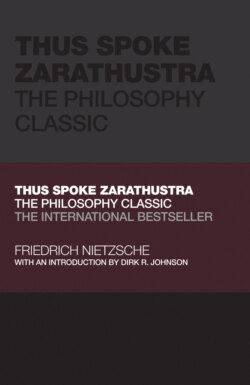Читать книгу Thus Spoke Zarathustra - FRIEDRICH NIETZSCHE, Friedrich Nietzsche - Страница 43
8.
ОглавлениеWhen Zarathustra had said this to his heart, he put the corpse upon his shoulders and set out on his way. Yet had he not gone a hundred steps, when there stole a man up to him and whispered in his ear – and lo! he that spoke was the buffoon from the tower. “Leave this town, Oh Zarathustra,” said he, “there are too many here who hate you. The good and just hate you, and call you their enemy and despiser; the believers in the orthodox belief hate you, and call you a danger to the multitude. It was your good fortune to be laughed at: and truly you spoke like a buffoon. It was your good fortune to associate with the dead dog; by so humiliating yourself you have saved your life today. Depart, however, from this town, or tomorrow I shall jump over you, a living man over a dead one.” And when he had said this, the buffoon vanished; Zarathustra, however, went on through the dark streets.
At the gate of the town the grave‐diggers met him: they shone their torch on his face, and, recognizing Zarathustra, they sorely derided him. “Zarathustra is carrying away the dead dog: a fine thing that Zarathustra has turned a grave‐digger! For our hands are too cleanly for that roast. Will Zarathustra steal the bite from the devil? Well then, good luck to the repast! If only the devil is not a better thief than Zarathustra! – he will steal them both, he will eat them both!” And they laughed among themselves, and put their heads together.
Zarathustra made no answer, but went on his way. When he had gone on for two hours, past forests and swamps, he had heard too much of the hungry howling of the wolves, and he himself became hungry. So he halted at a lonely house in which a light was burning.
“Hunger attacks me,” said Zarathustra, “like a robber. Among forests and swamps my hunger attacks me, and late in the night.”
“Strange humors has my hunger. Often it comes to me only after a repast, and all day it has failed to come: where has it been?”
And thereupon Zarathustra knocked at the door of the house. An old man appeared, who carried a light, and asked: “Who comes unto me and my bad sleep?”
“A living man and a dead one,” said Zarathustra. “Give me something to eat and drink, I forgot it during the day. He that feeds the hungry refreshes his own soul, saith wisdom.”
The old man withdrew, but came back immediately and offered Zarathustra bread and wine. “A bad country for the hungry,” said he; “that is why I live here. Animal and man come unto me, the anchorite. But bid your companion eat and drink also, he is wearier than you.” Zarathustra answered: “My companion is dead; I shall hardly be able to persuade him to eat.” “That does not concern me,” said the old man sullenly; “he that knocks at my door must take what I offer him. Eat, and fare you well!”
Thereafter Zarathustra again went on for two hours, trusting to the path and the light of the stars: for he was an experienced night‐walker, and liked to look into the face of all that slept. When the morning dawned, however, Zarathustra found himself in a thick forest, and no path was any longer visible. He then put the dead man in a hollow tree at his head – for he wanted to protect him from the wolves – and laid himself down on the ground and moss. And immediately he fell asleep, tired in body, but with a tranquil soul.
